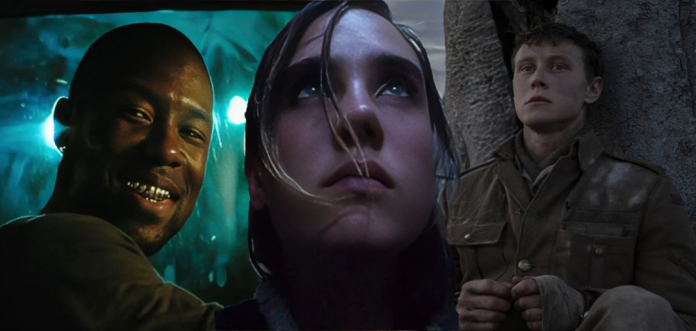Films have a special quality of not only entertaining but also educating, offering insight into many aspects of life, from the subtleties of human behavior to the complex workings of society. This article presents a list of ten films that promise more than just cinematic entertainment. Their aim is to “soften” your brain and deepen your understanding of the world.
Each of the selected films, with its compelling narrative and thoughtful themes, invites viewers to think deeply, question reality and gain new perspectives. From the frightening truth behind technological innovation to the stark reality of socio-economic inequalities, these films will make you laugh but also become much wiser.
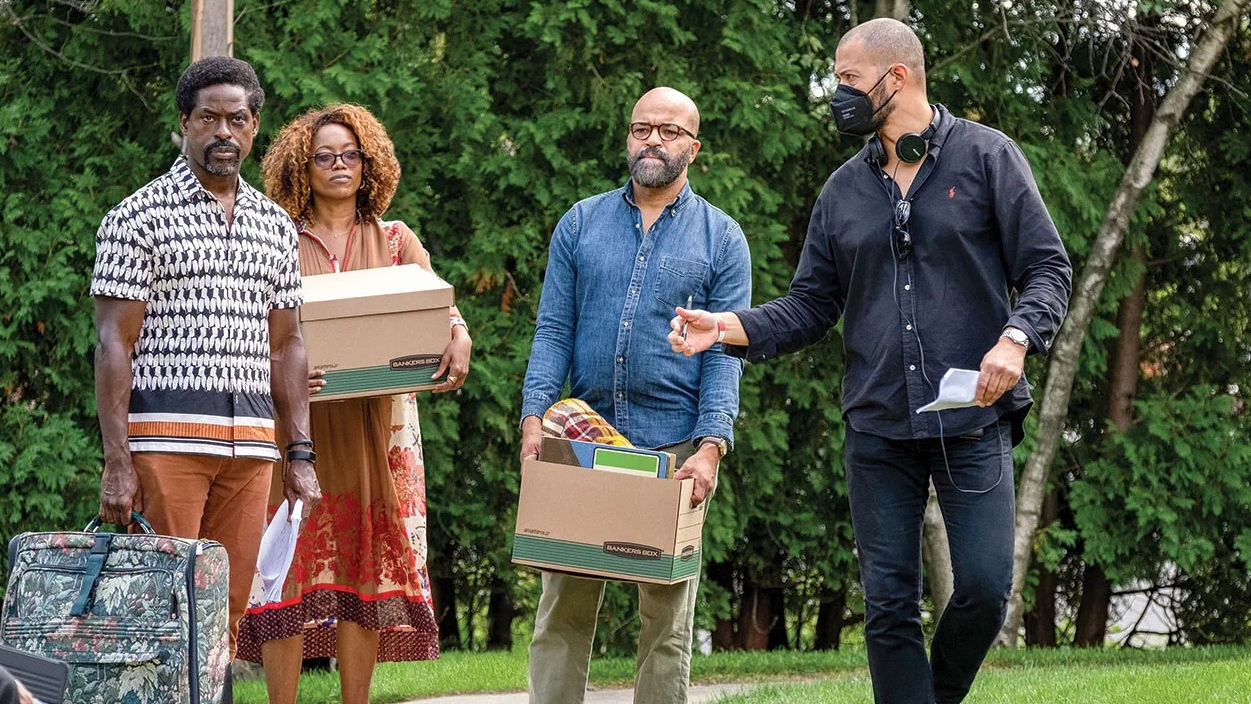
10. American Fiction (2023)
The American Film Institute has included this multi-award-winning debut feature from director Cord Jefferson in its list of the 10 best films of 2023. It received five nominations at the 96th Academy Awards, including Best Picture and Best Actor in a Leading and Supporting Role. It also has two Golden Globe nominations.
It would be interesting to delve deeper into such an uncommon phenomenon. Especially as it is a significant work in the coordinates of political correctness.
Based on Percival Everett’s novel Erasure, which appeared on the book market in 2001, the film tells the story of a disillusioned Los Angeles professor, Thelonious Ellison, who, as a black man, writes an unusually stereotypical black book as a satire, in order for the book to shock the readers, to be published in a large print run, and to be praised.
The man took this truly risky step when an editor reprimanded him for saying that his previous book was “not black enough”.
Now, to achieve his goal, the author wants to collect all the stereotypes of black people in the USA (devoted parents, sexual abuse, robberies, gang violence, drugs, etc.). Since most of these stereotypes are blatantly racist in the current world of political correctness, the author is publishing the book anonymously. What do you think? The book becomes an instant sensation and the writer who releases it into the world has to face totally unintended consequences.
The writer is offered a $750,000 advance and agent Arthur tries to persuade the author to use the name of an ex-convict. A film producer offers Ellison a contract to adapt the book under that name. But in response to all these initiatives, the author got angry and sabotaged the deal and insisted on calling the book “Fuck”.
It has long been known that in any business, nothing good comes without publicity and scandal. It is no secret that they are usually just made up. Well, writers with dreams of becoming famous certainly know the most important rule: “give the market what it wants”.
The film makes good use of the specificity of so-called blaxploitation cinema.
In the finale, the authors of American Fiction provide not one but several endings.
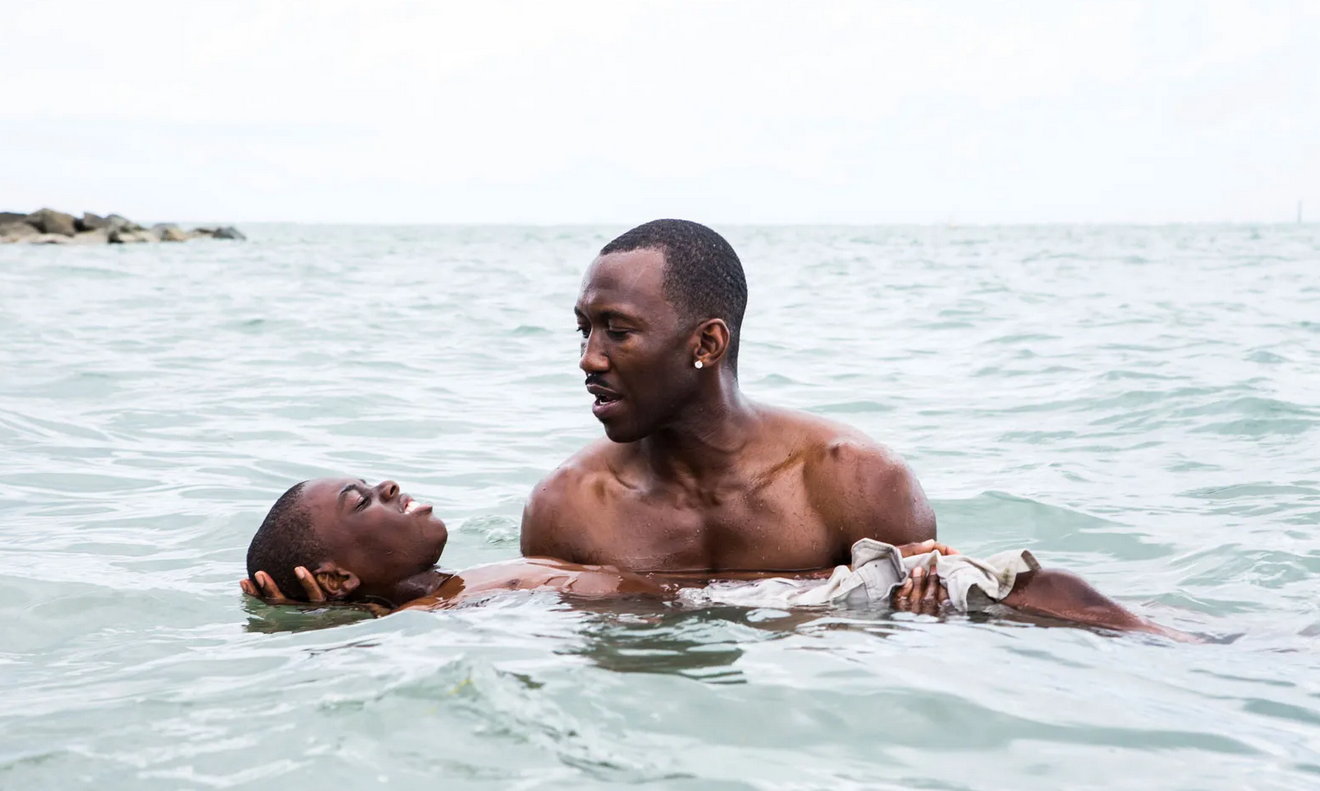
9. Moonlight (2016)
When a film takes home the Golden Globe for Best Drama Film and is among the nominees in five other categories, it is only natural that these titles create huge expectations. Moonlight, directed by Barry Jenkins, is a film that has its moments of poignancy, deals with difficult themes, and plunges the viewer into a maelstrom of difficult emotions. What makes this drama special?
Poverty, bullying, a drug-addicted mother; this inhospitable world has been with the protagonist, Chiron, since childhood. Paradoxically, he finds refuge in the home of Juan, a drug dealer. Here, he not only hides from the loneliness that afflicts him, but also spends time when his drug-addicted mother cannot find time to take care of him.
The film divides Chiron’s story into three parts: childhood, adolescence, and adulthood. Growing up, he becomes a drug dealer himself, following Juan’s lifestyle. But underneath the gold chains, expensive cars, muscles, and outward confidence, lies the same confused, sensitive child.
The inner dramas of a damaged personality are the main axis around which the film revolves. The links between traumatic experiences and the defense mechanisms that seek to suppress them are quite obvious. Called “little” as a child and bullied by his classmates, he grows up asserting himself with money and bulging biceps. The criminal world is left out of the film, and this maneuver only adds to the subtlety of the film.
Clichés always annoy me in cinema. The black drug dealer, the mother who brings men home, the school bullies who make Chiron’s best and only friend hit him. These and other motifs are rather trite, but I cannot say that they are very striking. It is true that the film sometimes lacks suggestiveness. Some scenes felt too artificial and predictable to me. Human life, on the other hand, is generally pretty predictable. Maybe that’s all right then.
“You have to decide what you want to be at some point and not let others decide for you”, says Juan. As he matures, Chiron comes closer to this thought, which leads the viewer to the film’s culmination. That turning point becomes the beginning of his new life, in which he seeks, not entirely successfully, to distance himself from his past.
The film carries a strong emotional weight, and this is its strength, which has been appreciated by countless audiences around the world. It is not a must-see masterpiece, but in the context of the “baked” films of 2016, it certainly does not fade away.
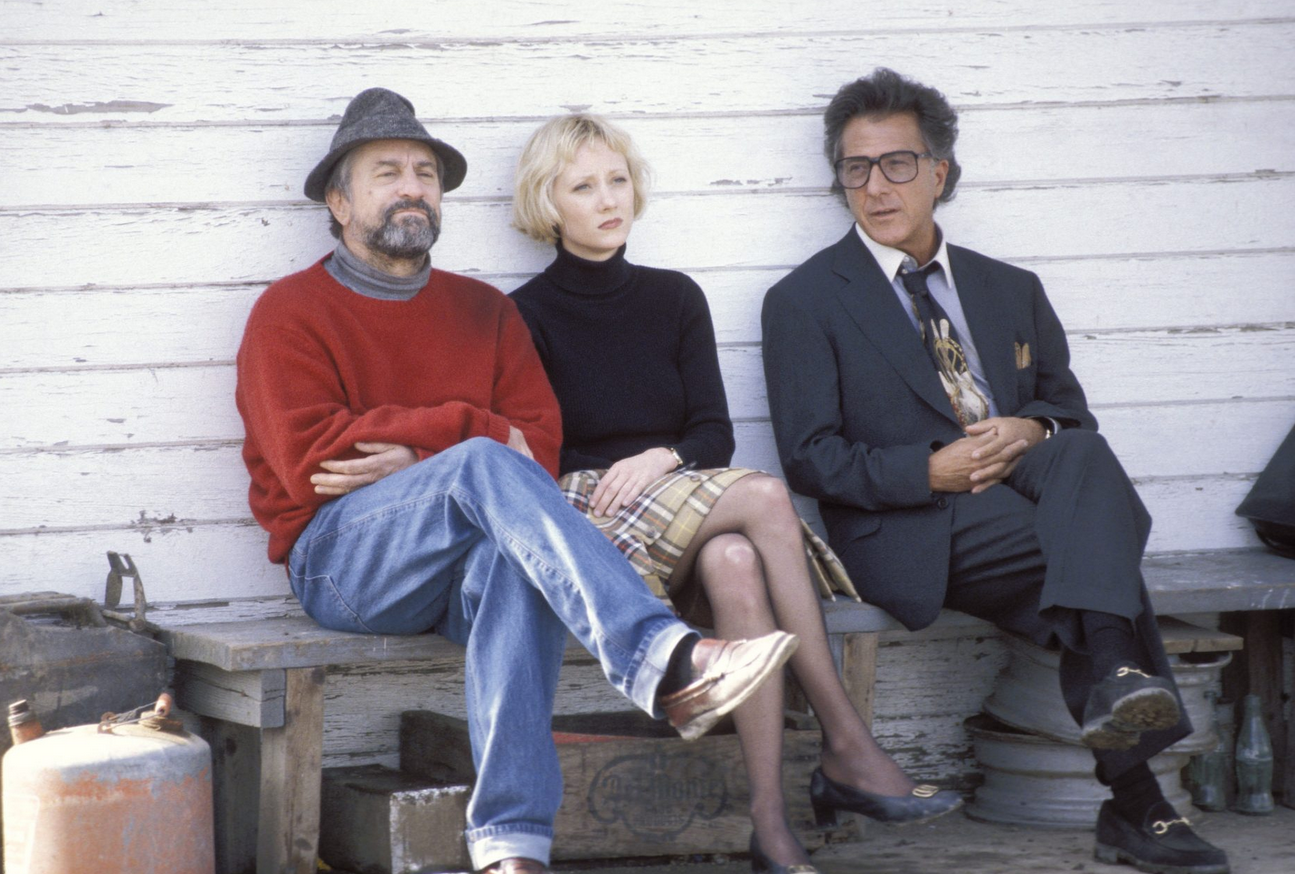
8. Wag the Dog (1997)
Based on the book by Larry Beinhart, Barry Levinson’s film tells the story of a US President (Michael Belson) who is accused of having an affair with an underage girl, all with only two weeks to go before the new presidential election. In order to protect the media from this news, the President’s advisor Winifred Ames (Anne Heche) hires a political consultant and Conrad Brean (Robert De Niro), who is a specialist in such situations. Brean advises them to fabricate denials about non-existent critical dangers, such as the denial about B-3 bombers.
This denial is real because no B-3s actually exist. Brean also visits Hollywood producer Stanley Motss (Dustin Hoffman) and assigns him the task of creating a patriotic campaign about the war in Albania. This film parodies how real political events are covered up and how often the news is fake, created only to divert public attention from the real events. (Milena Silvestravičiūtė)
Watching the film, it is scary how absurd and convincing this material is. Levinson deconstructs the media hype that accompanies any modern international crisis, based on a clever, witty screenplay by David Mamet and Hilary Henkin, based on Larry Beinhart’s book American Hero. Even when a conflict is real and necessary (e.g. the Gulf War), its packaging is always superficial and unquestioned. Like sports journalists, war correspondents renounce all pretensions of objectivity and detachment and cheerfully take sides.
Brean, played by De Niro, is a creature born to live in the shadows, and De Niro plays him with the verisimilitude of a real crook who lies like a professional. Their conversations are created by Mamet as a verbal ballet between two men who love the jargon of their trade.
“Why does a dog wag its tail?” Brean asks at one point in the film. “Because the dog is smarter than the tail. If the tail was smarter, it would wag the dog.” In Brean’s universe, the tail is smarter, and we are invited to be dogs.

7. Ex Machina (2014)
Ex Machina by Alex Garland is a gripping sci-fi thriller, one of the more impressive films about robots, which tests the capabilities of a robot’s artificial intelligence.
Caleb (Domhnall Gleeson), a young programmer working for one of the biggest internet companies in the world, is invited to take part in this challenge. He is given the extraordinary chance to spend a week with the company’s founder and CEO, Nathan (Oscar Isaac). In a remote laboratory in the mountains, Caleb is given the task of testing a girl robot, her self-improving artificial intelligence. However, as the research progresses, the young boy is left wondering what the leader, Nathan, is up to and what the robot’s position in his lab is.
The film focuses more on the blurring of the human-robot boundaries, the perception of each other, the feelings, but you won’t see any shocking effects here. The main action of the film takes place in one building, where the story unfolds. The British-made film does not have a huge budget like the American ones, so it follows a simpler path, revolving around three main characters and the development of their relationship.
Filmmaker Alex Garland introduces Ava, a robot with perfect proportions, charming looks and perfectly smooth skin. This becomes a far more powerful weapon than her artificial intelligence. Ava’s main task is not to scare you, but to slip into your head, which she does perfectly with Caleb. Their daily brief conversations, a few seconds of private confessions without cameras, push Caleb towards a closer and more dangerous friendship with Ava. This unfolding scenario is reminiscent of one of Jonathan Glazer’s films, Under the Skin. The essence is similar: how a human creation turns against its creator. In both films, the excessive freedom given to the creation frustrates the goals pursued and their overall peace. This shifting role of the leaders draws the audience ever closer to the screen and the two-hour story passes in 30 minutes.
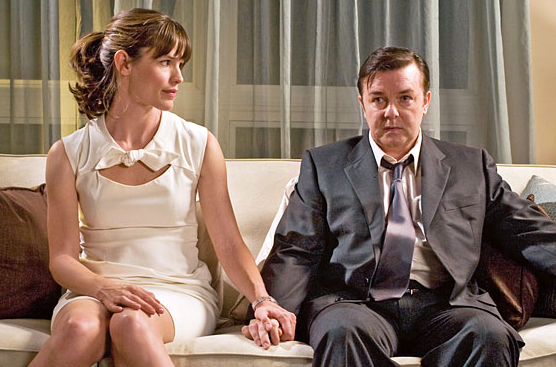
6. The Invention of Lying (2009)
Imagine a world where nobody lies or even thinks about it! Mark Bellison is a scriptwriter about to be made redundant. He is short, plump, with a wide nose; a man who is not attractive by nature, which means he has little chance of being with Anna, the woman he loves.
Once, while at the bank, he spills a seemingly innocent lie. Later, when he is on duty at his dying mother’s bedside, he lies again, creating a story about Paradise. The hospital staff overhear the story, believe every word, and start telling others. Thus, Mark becomes a prophet, his first fictional scenario makes him rich and he becomes a “good guy” in the eyes of society. But will it be enough to win Anna’s heart? The Invention of Lying paints a convincing and subtle picture of a man who only ever tells the truth, and vividly charts the colorful path of lies…
Lies touch everyone and things begin to change. Imagine how good it is for the inventor of the lie, everybody believes him. There is no point in doubting him because no one has ever thought of telling the untruth. In the mind of this debt-ridden scriptwriter, a cord is missing, and the lies pour out freely.
Nobody jumps out of exploding planes or fights in the open, but the pace of the film is fast enough, and it doesn’t drag. The cast, who do a great job, adds a lot to the enjoyable passage of time.
None of the actors stand out too much, they all fit together nicely and do not overshadow each other. The lead actor, Ricky Gervais, who plays the protagonist, Mark, is up to the task, and Jennifer Garner, who is seen alongside him, is more suited to the film than she might first appear. The episodic actors are also glamorous and deceptive, which no doubt helps The Invention of Lying earn its reputation as a complete film. You can see stars like Jonah Hill, Louis C. K. and Edward Norton in the film.
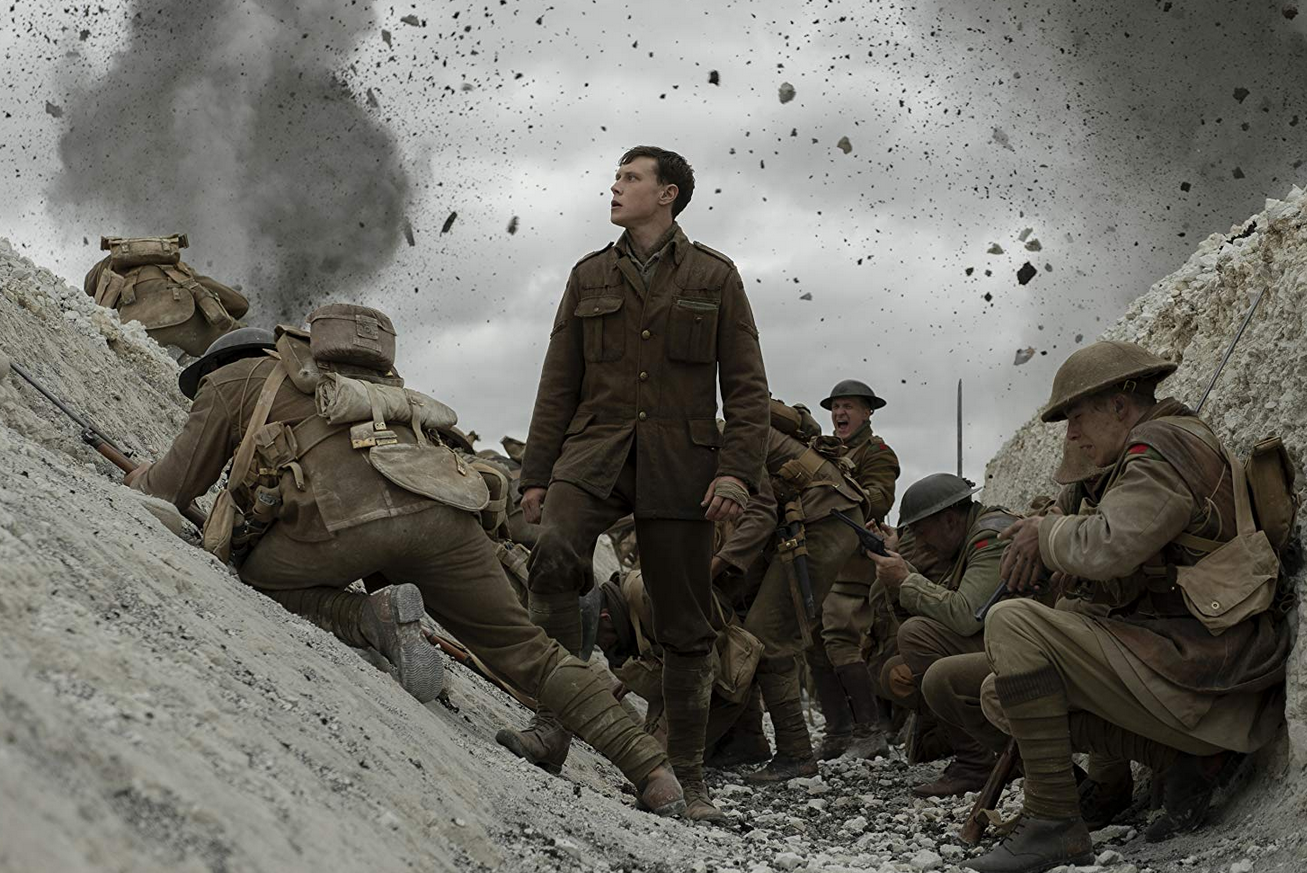
5. 1917 (2019)
April 6th, 1917. A brief respite in a spring-flowering meadow is interrupted by a command to march to HQ as soon as possible for two young privates, Schofield, and Blake (George MacKay and Dean-Charles Chapman). Since General Erinmore (Colin Firth), who has come specially to talk to the boys, it means that something extreme has happened. “It’s going to ruin the weekend,” complains one of the soldiers, who has no idea what the weekend will really be like.
At HQ, the boys are informed that British intelligence has learned that two battalions of their army, as many as 1,600 unsuspecting soldiers under Colonel Mackenzie, are marching fast in northern France in the wake of the retreating German army. Before Colonel Mackenzie (Benedict Cumberbatch) realizes that this is just a deceptive maneuver by the enemy, the British troops march straight into a trap laid by the enemy, only to be wiped out on the new front. Unfortunately, the normal lines of communication have been destroyed and the telegraph wires cut. The only way to warn of a deadly situation is to send messengers to the area of the upcoming conflict as soon as possible. To make it in time, the boys must cross the front line and the vast territory controlled by the enemy unnoticed. If they fail, more than 1,500 brothers-in-arms, including Blake’s older brother Joseph, will die. The situation is extreme. Not a second should be wasted.
Such a plan seems simple and clear only in theory. It is apparent that, once out of the trenches, the envoys will have to deal with a myriad of tactical problems, where there is no room for error, where the slightest careless movement can provoke a deadly threat, where even a rat can set off the detonator of an explosive. Not to mention an enemy plane that has been dropped on your head from nowhere. Time is running out; tension is building, and the military thriller finally reaches its boiling point just moments before Colonel Mackenzie’s command to attack the enemy.
The military drama with the laconic title 1917 was voted the best film of the year, and Sam Mendes the best director. Without a doubt, cinematographer Roger Deakins, who has been nominated for an Oscar 13 times, also deserves top honors. Mendes’ astonishing achievement fully engages the audience in a gripping, if heart-wrenching, tale of a tense race against the clock, all in a single shot. The incredible war drama 1917 not only won numerous awards, but also performed well at the box office, earning more than 384 million dollars.
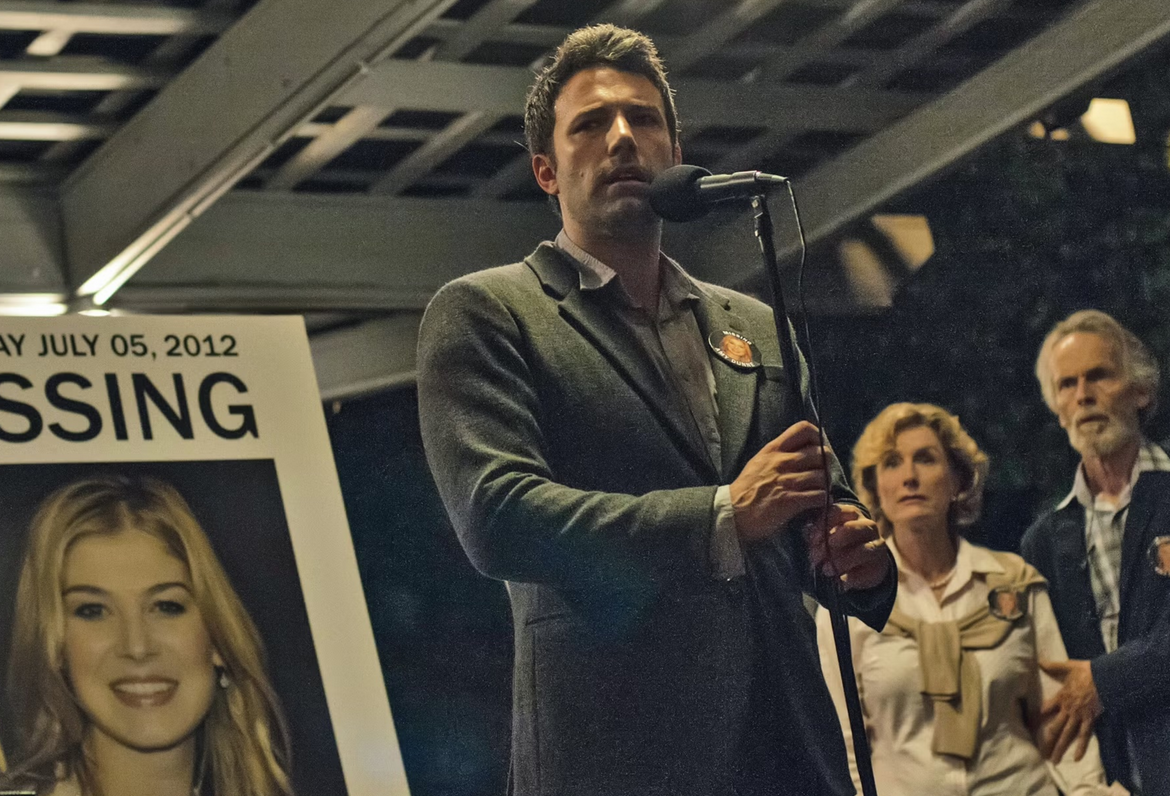
4. Gone Girl (2014)
Based on Gillian Flynn’s bestseller of the same name, David Fincher’s Gone Girl is a stylish but disturbing thriller about a crumbling marriage and a devastating desire for revenge.
The story opens with Nicholas returning home on the day of his and his wife Amy’s fifth wedding anniversary to find that she is missing. When traces of blood and a fight are found in the house, Nick becomes a suspect in the murder, despite his stubborn defense of his innocence. The police also find Amy’s diary, in which she describes in detail how Nick allegedly abused her. Nick becomes the prime suspect, portrayed by the media as a man who does not care about his wife, Nick desperately tries to repair his image and convince the people around him that he is not guilty.
David Fincher is undoubtedly one of the best dark filmmakers today. He proved it with the stunning Seven, the blockbuster hit Fight Club, and he has just proved it again with Gone Girl. This is not just a crime drama. It is all shrouded in a veil of mystery. Expect exactly that from this director.
Before the film is even halfway through, the plot takes an unexpected turn; Amy is alive and well, and she has planned her murder scene in order to compromise Nick and get money. She discovered that he was having an affair with one of her students and sought revenge. This fact changes the mood of the film and catches the audience by surprise. This unexpected and premature plot twist creates a big adrenaline rush.
The events that follow Nick to understand Amy’s plan, and he hires a famous lawyer to prove his innocence. After contacting his ex-wife’s ex-boyfriends, he discovers that she has been playing a trick on them as well, trying to prove that they have sexually abused her. He tries to get help from Desi, whom Amy has wrapped around her finger, but he does not reveal why.
She tries to free herself with Desi’s help by convincing him that Nick has been keeping her locked up. She sees her husband on a TV talk show and begging her to come back and is later arrested for murder. This is the kind of plot that would be suitable for a simple, unimaginative film, but Gone Girl is far from it. The story takes another turn when Amy realizes that the man on TV is the man she has fallen in love with, so she kills Desi and returns home, thus clearing Nick of the charge of her murder.
He tries to break up with her, but she claims she is pregnant. Nick becomes hostage to the situation and feels he has to stay with his wife.
Just like in the book, the film is fluid and unique, and goes beyond the solving of a murder mystery. The mistaken belief that the story flows in a single line repeatedly seems to pull the solid ground out from under the viewer’s feet, making the film a thrilling and surprising spectacle.
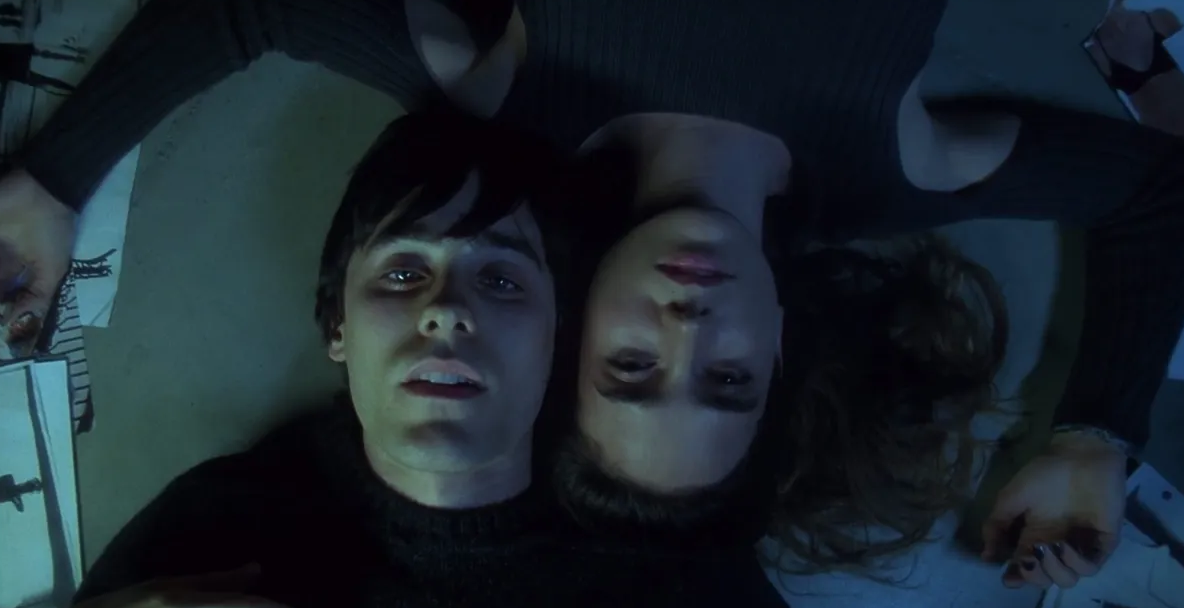
3. Requiem for a Dream (2000)
Though Requiem for a Dream has an official IMDB rating of 8.4, this masterpiece is just asking to be rated a solid 10. There are some films that simply resonate. It doesn’t matter how long you’ve been watching them, what company you’ve been with, or what time of day, they just stay with you forever. The drama Requiem for a Dream is exactly that. Touching and memorable.
With this film, director Darren Aronofsky has laid a solid foundation and made a name for himself as a talented filmmaker. It is true that, after presenting such a strong work, say, in the middle of his career, he is no longer able to surprise audiences so powerfully. It is simply a case of being very difficult to outsmart oneself. Even though the director has shone quite brightly again with Black Swan, Requiem for a Dream remains a solid masterpiece.
The group of young people, Harry, Marion, Tyrone, are charming and brave, driven, and passionate. They crave easy money and endless life pleasures. They make their money by dealing with drugs, and as reliable dealers they get a little taste of their own product. To know if they are selling quality product. It is not easy to admit that this is not a taste, but an addiction, and it is not something that one wants to do. Dose after dose, syringe after syringe, and the group’s dreams turn into nightmares, and there is no way to out.
Alongside all this is a sub-plot that also demonstrates how quickly the addiction from dreams turns into nightmares. Harry’s mother, Sarah, an elderly single woman, lives more in the TV world than in the real world and one day her dream comes true when she is invited to the set of her favorite TV show. She sets out to look her best and in doing so, she develops a new addiction: weight loss. Losing weight by dieting is difficult, so she tries to do it by radical methods. The weight is coming off, but so is her whole life…
The director skillfully and hauntingly reveals the power of addictions and emphasizes how tiny and fragile the border is between dreams and nightmares.

2. Spotlight (2015)
Based on true events, the feature film Spotlight takes us back to 2002, when American society was rocked by the scandal of priests abusing children. The investigation, which lasted more than a year, shook the Church, one of the world’s most stable organizations, to its foundations and won journalists a Pulitzer Prize.
In 2002, America had not yet recovered from the shock of 11 September the year before. But in Boston, Massachusetts, the Boston Globe, an American daily newspaper renowned for its investigative journalism, receives the unthinkable news that several priests in the local archdiocese have been suspected of child molestation. Church representatives categorically deny this information. The news is so terrible that no one seems to want to believe it.
The mood in the newspaper’s investigative department is bad anyway. With the recent change of management, the future prospects of the staff are uncertain. There are no themes that could improve the stagnant publication. An almost accidental sensation discovered by the new editor, Marty Baron (Liev Schreiber), promises a sudden breakthrough, but the road to the truth will be long and confusing. Victims and witnesses of the scandal are reluctant to speak out: the victims find it painful to recall their suffering and humiliation, and the ministers of the Church, assisted by an army of experienced lawyers, are silent. The truth has triumphed: it is in the wake of this scandal that the Catholic Church has finally officially acknowledged that not all God’s servants are without sin.
What could be so interesting about the daily routine of a newspaper editorial office? For an intriguing film, this does not seem to be the most rewarding environment. But director Tom McCarthy has managed to develop a real thriller here, which starts quietly and then picks up the pace, and develops well the suspense that thriller classic Alfred Hitchcock cherished. Evil and paranoia it provokes overwhelm all those caught up in the terrible wave of pedophilia.

1. Parasite (2019)
Parasite was awarded the Palme d’Or at Cannes, while South Korean director Bong Joon-ho’s previous film Okja (2017) was controversial and angrily rebuked by festival organizers. On the night of 10 February in Los Angeles, the US Academy of Motion Picture Arts and Sciences awarded Parasite 4 Oscars at a ceremony. For good reason. The film was named Best Film, Best Foreign Film, Best Original Screenplay, and Bong Joon-ho won the Oscar for Best Director. Parasite is also the first non-English language film to win in the Best Film category.
Parasite was described by its director, Bong Joon-ho, as “a comedy without clowns and a tragedy without villains”. Like his colleague Hirokazu Koreeda, Bong Joon-ho views his film’s characters with undisguised sympathy and does not rush judgement, even though the families at the center of both films behave in clear violation of the law. The family of thieves, who live in the slums of Tokyo, obtain food and necessities by stealing. Shoplifting is not their only source of livelihood, but also a kind of fun ritual. The family does not even consider this activity a crime and likes to say: “As long as things are on the shelf, they don’t belong to anyone”. Hence, stealing them is not theft.
The characters in the Parasite are driven to commit crime by the same social problem: poverty, which, as we see in the thieving family, is a great stimulus for inventiveness. The members of Kim Ki-taek’s family are also resourceful. They fight modern social exclusion in a very original way: they find a wealthy family and slowly take over their home. The anecdotal situation slowly evolves into a beautiful metaphor where everyone deserves the label of parasite; both those who, in less than virtuous ways, accumulate capital and use it to create their own luxurious wealth, and those who brazenly and selfishly take advantage of other people’s wealth.
Born into a poor family, Bong Joon-ho wrote the screenplay for Parasite after recalling his youthful experiences. As a student, he contributed to his scholarship by working as a tutor. One day, this activity led him to a luxurious house with a sauna and a swimming pool. The plot of Parasite also begins with a visit by a young tutor to the home of the wealthy Park family. His aim is to teach the owners’ daughter English. But soon other members of the new lodger’s family appear one by one in the Park’s house. This is the beginning of what the director describes as a growing number of cases in which one group of people becomes psychologically dependent on another: “You can’t say that the characters in the film became parasites from the start. They are our neighbors, friends, and colleagues on the edge of the abyss. In a world like ours, who could condemn a family struggling to survive and call such people parasites?”

